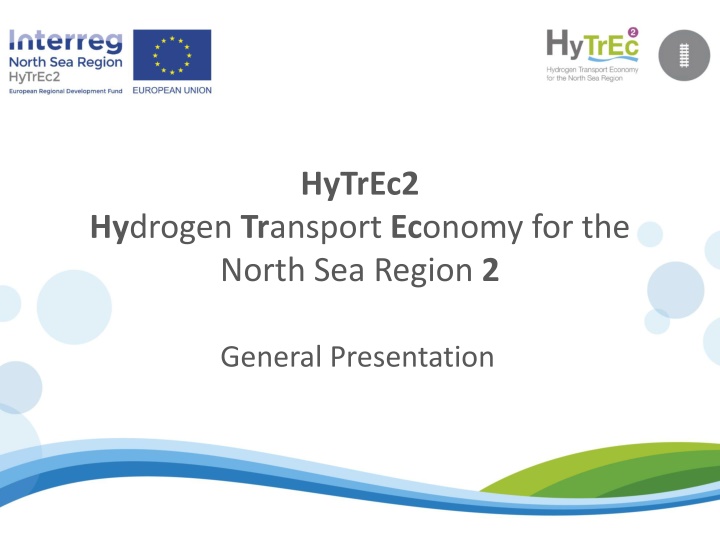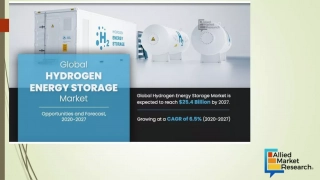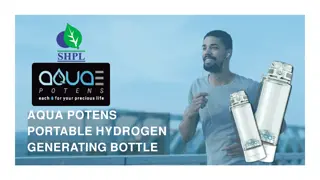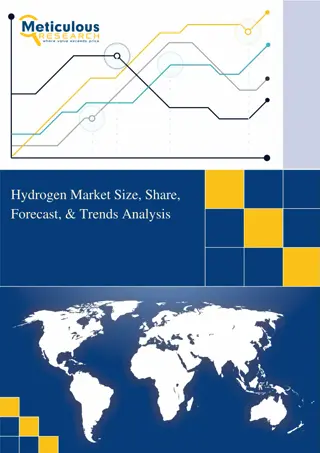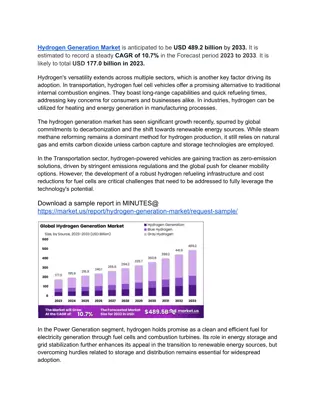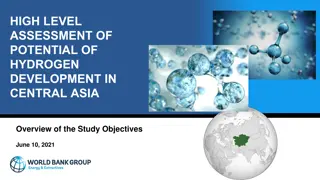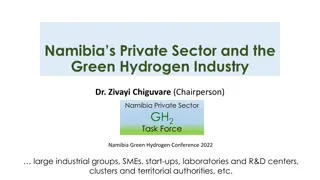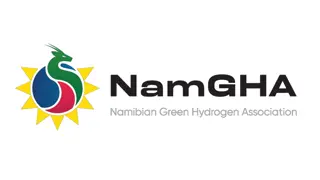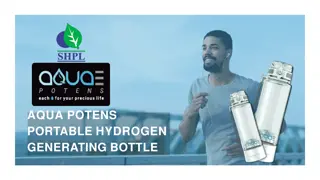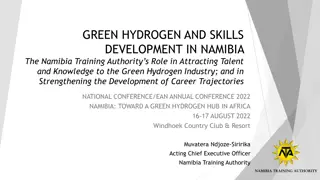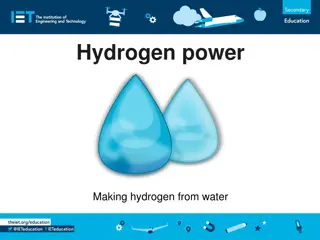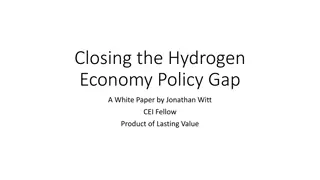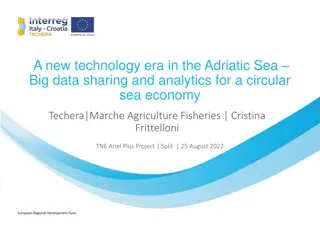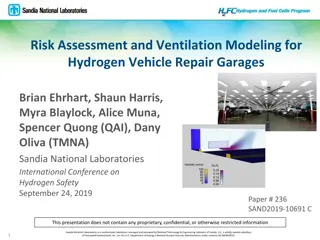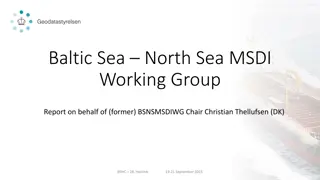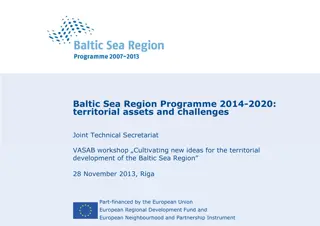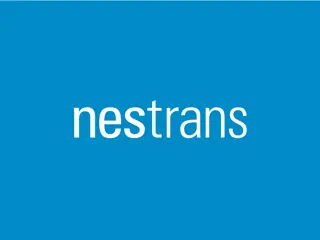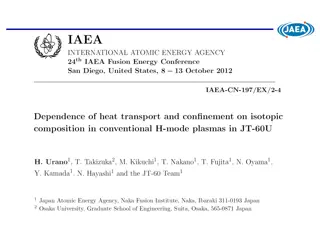HyTrEc2: Advancing Hydrogen Transport Economy in the North Sea Region
"HyTrEc2, a project under the Interreg VB North Sea Programme, aims to promote green transport and mobility by implementing innovative hydrogen transportation solutions. With a vision to stimulate hydrogen-fueled transport for a sustainable future, the project focuses on developing zero-emission solutions for fleets, establishing a Center of Excellence for hydrogen transport, and creating common standards. By pioneering green transport solutions like hydrogen fuel cell electric vehicles, HyTrEc2 seeks to reduce oil dependency in the transportation sector and contribute to EU energy and climate change targets. Collaboration and cooperation play key roles in fostering a market for cost-effective green hydrogen and advancing infrastructure and technology for hydrogen-powered vehicles across the North Sea Region."
Download Presentation

Please find below an Image/Link to download the presentation.
The content on the website is provided AS IS for your information and personal use only. It may not be sold, licensed, or shared on other websites without obtaining consent from the author.If you encounter any issues during the download, it is possible that the publisher has removed the file from their server.
You are allowed to download the files provided on this website for personal or commercial use, subject to the condition that they are used lawfully. All files are the property of their respective owners.
The content on the website is provided AS IS for your information and personal use only. It may not be sold, licensed, or shared on other websites without obtaining consent from the author.
E N D
Presentation Transcript
HyTrEc2 Hydrogen Transport Economy for the North Sea Region 2 General Presentation
The Hydrogen Transport Economy (HyTrEc) 2 project is part of the Interreg VB North Sea Programme Region Programme and is partly funded by the European Regional Development Fund. Falls within programme Priority 4: Promoting green transport and mobility Total budget of 5,246,271 of which the ERDF Contribution is 2,197,940 Five year project from 2016 to 2021.
Vision: Stimulating hydrogen fuelled transport solutions for business, for the environment, for the future.
Objectives Implementing innovative hydrogen transportation solutions involving vans, large trucks and refuse collection vehicles to advance the case for zero emission solutions for public and private sector fleets. Improving the supply chain and training so that the NSR becomes a Centre of Excellence for hydrogen transport. Developing innovative methods for the production, storage and distribution of green hydrogen. Complementing national programmes for hydrogen and facilitating joint NSR approaches and common standards.
Pioneering 93%1 of transport is currently oil based. Green transport solutions, such as hydrogen, will play a key role in achieving EU energy and climate change targets. Hydrogen Fuel Cell Electric Vehicles (FCEV) have a longer range than electric battery vehicles. This extended range is essential in those North Sea regions which have numerous small sized cities with a large suburban and rural hinterland. 1http://ec.europa.eu/eurostat/web/products-datasets/-/tsdcc340
Collaboration Current market failure caused by the high cost of FCEVs and the need to make green hydrogen cheaper through more cost effective green hydrogen production, storage and distribution. HyTrEc2 will create conditions so that a FCEV market can develop providing a platform for collaborative development of strategies and initiatives that will inform and shape the development of infrastructure, technology and skills.
Cooperation The project will establish a transnational network which will improve accessibility to hydrogen powered vehicles and fuel across the North Sea Region as an alternative energy sector by: Testing a range of transportation technologies such as fuel cell, range extenders, and dual fuel vehicles. Investigate ways to improve production, storage and distribution of green hydrogen including use of solar and wind power.
Cooperation Develop the supply chain for green hydrogen transport and identify the training requirements and organisations that would benefit from training as well as identifying common rules and standards for the use of hydrogen in the transport sector. Trialling an app that can be used transnationally to show the location of fuelling stations, their real time availability and safety standards etc.
Deliverables Deliverable Target Number of hydrogen vehicles tested 33 Green hydrogen from wind and solar 2 Number of people trained in hydrogen 80 Number of businesses entering the supply chain 25 Report of hydrogen transport rules and standards 1 Report on business case and economic modelling of green hydrogen 1 Report on distribution of hydrogen in isolated regions 1 Report on supply chain mapping 2
Outputs Indicator Target Number of new and/ or improved green transport solutions adopted 6 Number of enterprises participating in cross-border, transnational or interregional research projects 25 Number of research institutions participating in cross-border, transnational or interregional research projects 10 Number of organisations/ enterprises adopting new solutions by project end 50 Number of organisations/ enterprises informed about new solutions by project end 150
Results Indicator Definition 25% reduction in the cost of hydrogen vans, large trucks and other tested vehicles Reduction in the cost of hydrogen vans, large trucks and other tested vehicles 18 public sector organisations and transport operators investing in hydrogen vans and other tested vehicles Additional organisations purchasing/ testing hydrogen vehicles 18 kg/per vehicle per month reduction in CO2 from tested vehicles Hydrogen vehicles to have a target of 18kg/ month less than equivalent diesel model
Key Partner Activities Aberdeen City Council Fleet demonstration of retrofit fuel cell, range extenders and dual fuel vans Fleet deployment of refuse collection lorry Production of green hydrogen using wind turbines and electrolyser Supply Chain Development and Training Supply chain mapping report and study for the NSR Aberdeenshire Council Fleet demonstration of retrofit fuel cell, range extenders and dual fuel vans
Key Partner Activities CENEX Monitoring and analysing the operational efficiency of a wide range of hydrogen vehicles Overview of hydrogen transport rules and standards in the NSR Provincie Drenthe Sustainable Transport Living Lab at Groningen Airport Fleet demonstration of retrofit fuel cell, range extenders and dual fuel vehicles Fleet deployment of large truck for Living Lab Supply Chain Development and Training Business case development of a power to gas facility storing excess solar energy as hydrogen
Key Partner Activities Europaisches Institut fur Innovation Development of mobile phone app for location of hydrogen refuelling stations and communication platform Fleet demonstration of retrofit fuel cell, range extenders and dual fuel vehicles Low Carbon Hydrogen Production, Storage and Distribution Supply Chain Development and Training Gemeente Groningen Fleet demonstration of retrofit fuel cell, range extenders and dual fuel cars and vans Fleet deployment of large trucks Low Carbon Hydrogen Production, Storage and Distribution and use of solar energy to power a Hydrogen Refuelling Station
Key Partner Activities SP Sveriges/ RISE Development of large hydrogen fork lift truck simulation Overview of hydrogen transport rules and standards in the NSR Business case and economic modelling for green hydrogen production Report on the distribution of hydrogen in isolated regions Supply Chain Development and Training Hogskolen I Narvick/ UiT Fleet demonstration of retrofit fuel cell, range extenders and dual fuel vans, forklift and cars Improvement of Hydrogen Refuelling Station Supply Chain Development and Training Development of Training Modules
For more information: northsearegion.eu/hytrec2 Project Manager Louise Napier lnapier@aberdeencity.gov.uk Tel: + 44 (0)1224 523327 Mob: + 44 (0)788 000 2510
